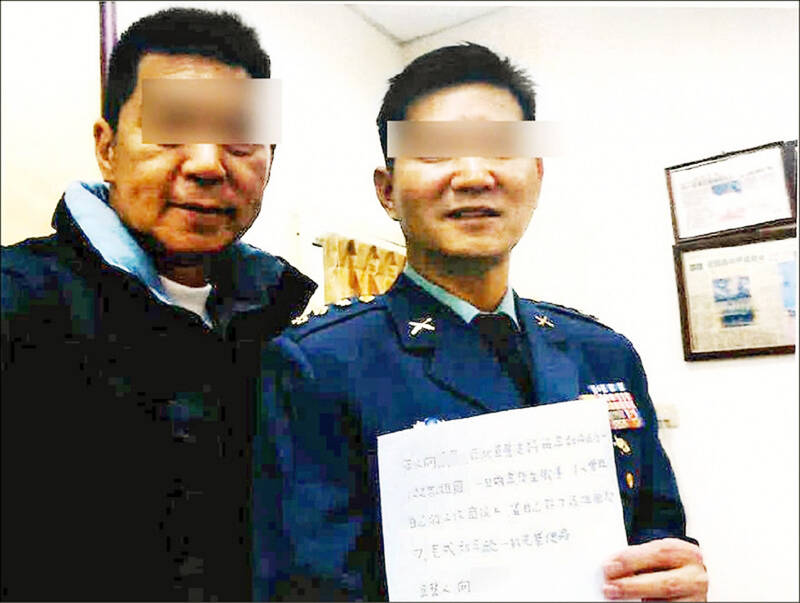The Kaohsiung District Court yesterday sentenced former army colonel Hsiang Te-en (向德恩) to seven-and-a-half years in jail and ordered him to repay NT$560,000 that he received in bribes from Chinese sources to work as a spy.
Hsiang in November last year was accused of signing a document of surrender with the Chinese Communist Party (CCP), posing with the document in military attire and pledging assistance, to the best of his abilities, in the event of an invasion.
Hsiang headed the Kaohsiung-based Army Infantry Training Command’s Operations Research and Development Division.

Photo: Copied by Huang Chia-lin, Taipei Times
According to the ruling, Hsiang, 49, was recruited by Shao Wei-chiang (邵維強) to work as a Chinese spy.
Hsiang received NT$40,000 a month from Shao, totaling NT$560,000 over 14 months, the court said.
Hsiang could not be charged with contravening Article 2 of the National Security Act (國家安全法) or treason under the Criminal Code, because evidence had been removed from the cellphones of those who were implicated, it said.
The ruling, which also includes disenfranchisement for four years, can be appealed.
Shao, the owner of a local travel agency, in 2005 learned that his firm employed a woman surnamed Yu (尤), whose then-husband, Hsiang, was in the military.
Shao began to make overtures to Hsiang, the ruling said.
Yu and Hsiang divorced in June 2018.
The ruling said that Shao treated Hsiang to banquets and gifts, and told him that he was a distant relative of late Chinese People’s Liberation Army general Xiang Shouzhi (向守志).
In January 2020, Hsiang donned his military uniform and made a video, stating: “I, Hsiang Te-en, here do pledge that I support the peaceful unification of both sides of the [Taiwan] Strait. I will serve the motherland and the organization to the best of my abilities while remaining in my current position to ensure the holy and honorable mission of ushering in peaceful reunification as early as possible,” the ruling said.
Shao has been charged with contravening the National Security Act and the Banking Act (銀行法), and with corruption under the Criminal Code.

Beijing could eventually see a full amphibious invasion of Taiwan as the only "prudent" way to bring about unification, the US Department of Defense said in a newly released annual report to Congress. The Pentagon's "Annual Report to Congress: Military and Security Developments Involving the People's Republic of China 2025," was in many ways similar to last year’s report but reorganized the analysis of the options China has to take over Taiwan. Generally, according to the report, Chinese leaders view the People's Liberation Army's (PLA) capabilities for a Taiwan campaign as improving, but they remain uncertain about its readiness to successfully seize

Taiwan is getting a day off on Christmas for the first time in 25 years. The change comes after opposition parties passed a law earlier this year to add or restore five public holidays, including Constitution Day, which falls on today, Dec. 25. The day marks the 1947 adoption of the constitution of the Republic of China, as the government in Taipei is formally known. Back then the Chinese Nationalist Party (KMT) governed China from Nanjing. When the KMT, now an opposition party in Taiwan, passed the legislation on holidays, it said that they would help “commemorate the history of national development.” That

Trips for more than 100,000 international and domestic air travelers could be disrupted as China launches a military exercise around Taiwan today, Taiwan’s Civil Aviation Administration (CAA) said yesterday. The exercise could affect nearly 900 flights scheduled to enter the Taipei Flight Information Region (FIR) during the exercise window, it added. A notice issued by the Chinese Civil Aviation Administration showed there would be seven temporary zones around the Taiwan Strait which would be used for live-fire exercises, lasting from 8am to 6pm today. All aircraft are prohibited from entering during exercise, it says. Taipei FIR has 14 international air routes and

The Ministry of National Defense (MND) today released images of the military tracking China’s People's Liberation Army (PLA) movements during the latest round of Chinese drills around Taiwan. The PLA began "Justice Mission 2025" drills today, carrying out live-fire drills, simulated strikes on land and maritime targets, and exercises to blockade the nation's main ports. The exercises are to continue tomorrow, with the PLA announcing sea and air space restrictions for five zones around Taiwan for 10 hours starting from 8:30am. The ministry today released images showing a Chinese J-16 fighter jet tracked by a F-16V Block 20 jet and the